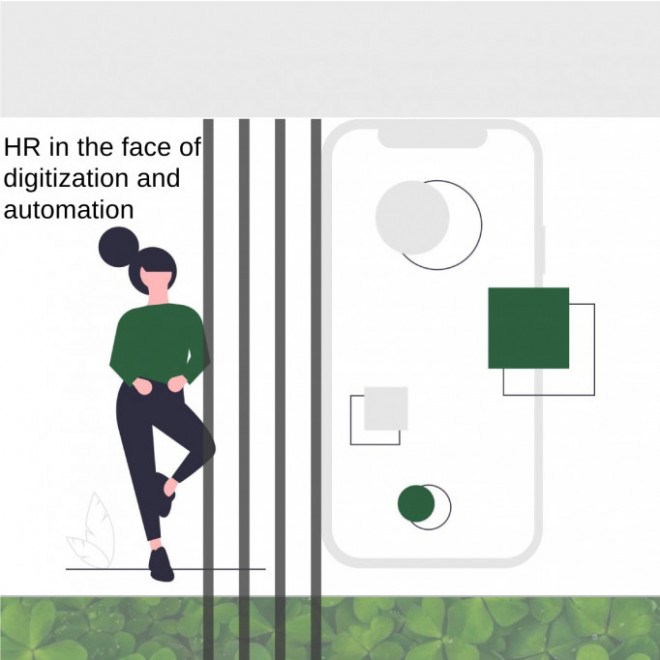HR challenges and the reality of the emerging "new world of work" in the integration of IT, tele information and building automation systems.When talking about industry, technology and machines are the most commonly thought of. However, the pace of development and its success largely depends on people. What features and competences should employees have?
Another important issue relating to soft skills is the ability to reason logically and analyze data. In the past, the latter was reserved for professions such as financial analysts. Today, in such a dynamically changing environment, data collection and analysis are necessary in every professional area, because by analyzing data, we give ourselves a chance to be a step ahead of the competition. This is connected with another desirable feature - the ability to act quickly and make strategic decisions. Among the most important abilities is currently combining knowledge from many fields and flexibility. The latter is expected today by both the employer and the employee. When preparing for change, remember that the Millennium Generation is entering the labor market. They, in particular, expect autonomy at work, but also flexible forms of employment. Likewise, employers today expect non-standard working hours and work in an international and intercultural environment.
What will be the biggest challenge in terms of personnel adaptation?
What is already the most difficult in many areas is changing the way of thinking, learning new things and unlearning old ones, and the ability to work in an environment that connects different generations. Large-scale publications about the generation entering the market, often demonizing them, show that we need to learn to cooperate and understand different approaches to work. It is worth noting that the new generations of employees described in sociological research are largely shaped by technologies.
From the point of view of human resource management, the management of the generation entering the market is completely different from the current one, but I am far from exaggerating this problem. These people grew up in the Internet age and most of their lives are done online and using the latest technology. Representatives of the Millennium Generation, currently entering the labor market, are proficient multitaskers, easily adapting to changes, and extremely impatient at the same time. Personally, I see a positive in this, because young employees are hungry for technology and are very eager to use it in their daily work. There is only a question of skilful management of this generation - innovative management, the ability to work with them, setting goals according to their expectations and motivating them appropriately. This is what the challenge is.
The elements of the fourth industrial revolution include intelligent machine management and the integration of people and machines. What is the biggest challenge in this respect in terms of employees?
The Internet of things plays a large role, thanks to cooperating intelligent machines that communicate with users, based on connected systems that seamlessly support activities along the entire value chain and create a fully digital landscape. This means lowering costs, improving efficiency, speed and scale of production, as well as better products and services.
From the employer's point of view, it is very important to verify what competences they have and what they will have to acquire from the market. Often the biggest challenge is to change the mindset and approach to work in order to get machines into production plants at all.
The function of many professions is already transforming. Even HR, or Human Resources, must change its role if it wants to keep up with the changing world. In order to be a partner for company boards, specialists in this field should make managers aware of what digitization is understood in its entirety and its consequences. This means developing the competencies of managers that create a new quality of management, adequate to the digitization era, developing and preparing employees for effective functioning in this era, as well as comprehensive verification of the tools used in terms of new directions for the organization. Without changing the approach to development and new market requirements, employees will be left behind in the labor market and companies will be lagged behind the competition.
How can companies transforming their operations in the spirit of concepts prepare themselves and their employees for a painless entry into this new reality?
A few years ago, it was fashionable to create R&D departments in companies. Unfortunately, in many cases it only meant that the current development department or another responsible for new products changed its name to R&D. The case is similar today. There are many new and overused fashionable statements and words, as well as a lot of interesting publications on innovation, cybersecurity or digitization. Unfortunately, I regret to say that in many cases it ends with the nomenclature. We need to fundamentally change the way we think and then act. There are still too few real initiatives helping in the development of competences adapted to the fourth industrial revolution on our market.
Of course, companies should develop the competences of key employees, adapting them to the changes taking place. From the point of view of HR departments, the way of working with business, responding to needs and acquiring competencies from the market must change. Competency management in the organization and motivation to work become key. The emerging technological tools supporting the functioning of companies must be used to optimize processes, but not to stiffen them. Employing the right employees with innovative competences and managing the talents that we already have on board give the company a great opportunity to develop initiatives within the organization, which will allow it to efficiently adapt to the rapidly changing economy.
Many studies show that culture and commitment organizations have less difficulty recruiting, serving customers more reliably, have the lowest voluntary staff turnover, and are more profitable in the long run. Unfortunately, very few enterprises have procedures and tools in place to analyze their organizational culture and find inconsistencies, strengths and weaknesses in it.
Another important issue is the direct transformation of the HR department itself. This is another of the key undertakings on the way to fit into the "new world of work". As a basic requirement, I mention the need to redefine the HR function from a service provider to a unit enabling talent stimulation and shaping. Every industrial revolution raises workers' concerns.
How can an employee prepare to face the challenge?
Half jokingly, let me say it's very good that we are afraid. I belong to people who are constantly developing and every employee, wanting to adapt to the changing reality, should focus on competence development. We do not like to leave our comfort zone, which we have created for ourselves in the professional sphere. However, sticking to the principle "I have a job and I do not intend to change it", we are currently risking a lot, regardless of the position. Today, it is important to develop, expand competences, and often, as I have already mentioned, also unlearn old habits. There is a lot of talk about the fact that in the future some professions will be replaced by new ones, so it is very important to think about what my position will look like in a few years.
What new professions will appear in the coming years?
The need for workers in production and assembly as well as those performing routine mental tasks such as production planning may decrease. On the other hand, the demand for employees with technical competences in the IT area will increase significantly, e.g. dealing with programming, data analysis, designing IT solutions and interfaces for machine users, as well as for employees from research and development areas.
The dynamics of the changes taking place mainly results from the emergence of completely new technological areas, which force the development of new competences. Industry creates new interactions between humans and robots. These interactions significantly affect the way work is performed and organizational structures in the enterprise. New specializations will appear mainly in the field of engineering. Engineers must develop in the coordination of robots, as simulation experts or, for example, service engineers using digital technologies in place of a service technician. In turn, the development of R&D departments requires that companies acquire R&D, IT and digital support systems competences.


 Posted on Aug 6, 2020 by Anna
Posted on Aug 6, 2020 by Anna


